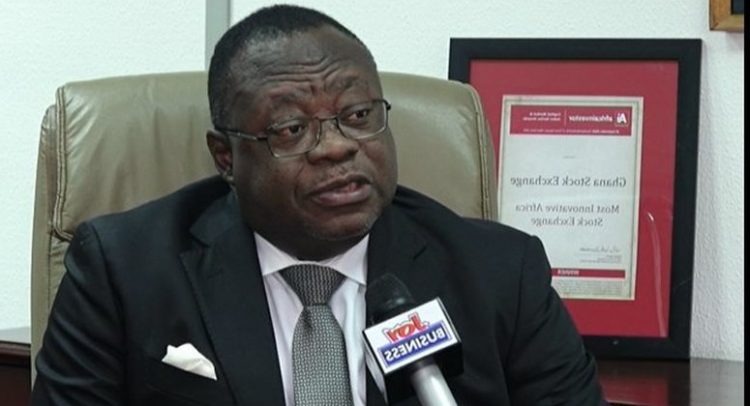Ekow Afedzie, MD, GSE
TOTAL MARKET capitalization of the Ghana Stock Exchange (GSE) at the end of April 2020 was GH¢55.2 billion, representing a decrease of 5.8 per cent (GH¢3.4 billion).
This compares with a decline of 11.4 per cent (GH¢7.5 billion) in April 2019.
A new Bank of Ghana (BoG) report, which made this known, said the decrease in market capitalization for the review period reflected declines in the values of most equities on the exchange, especially the financial stocks.
“There is some uncertainty in the outlook for the bourse as the challenges associated with disruptions of logistic chains of most companies and the economic lockdowns appear to have heightened investor sentiments towards offloading of their securities,” the report said.
However, it said the softening yields on money market instruments may constitute positive development for the market.
Composite Index
“The GSE Composite Index (GSE-CI) closed April 2020 at 2,100.7 points, a loss of 243.6 points compared with an index level of 2,344.3 points in the same period last year.
This development has translated in a decline of 10.4 per cent in April 2020 against a decrease of 32.8 per cent in the corresponding period in 2019.
The GSE-Financial Stocks Index (GSE-FSI), the main driver of the overall performance within the period, closed at 1.904.4 points, representing a loss of 5.8 per cent compared with -36.8 per cent for the corresponding period in 2019,” it said.
Deposit Money Banks
Deposit Money Banks (DMBs) credit to the private sector and public institutions increased by GH¢7,358.1 million (or 16.5%) in the 12-month period to March 2020, down from GH¢8,594.0 million (or 23.9%) over the corresponding period in 2019.
Private sector credit accounted for a share of GH¢6,617.5 million (or 89.9%), compared with GH¢7,001.8 million (or 81.5%) during the same period in 2019.
The flow of credit to the private sector was concentrated in five sub-sectors including services, commerce and finance, construction, manufacturing and transport, storage and communication, which collectively absorbed 79 per cent of the credit extended over the period.
Outstanding credit to the private sector at the end of March 2020 was GH¢45,339.5 million compared with GH¢38,722.1 million, last year.
In real terms, growth of credit to the private sector over the 12-month period to March 2020 was 8.6 per cent, down from 14.6 per cent during the corresponding period in 2019, thus, moving below the long-term trend.
It added that “DMBs average lending rates similarly eased downward by 71 basis points from 23.09 per cent in April 2019 to 22.38 per cent in April 2020. The average rate on three-month term deposits remained unchanged at 11.50 per cent. The general decline in nominal interest rates and the recent jump in inflation pushed real interest rates significantly down.”
BY Samuel Boadi


